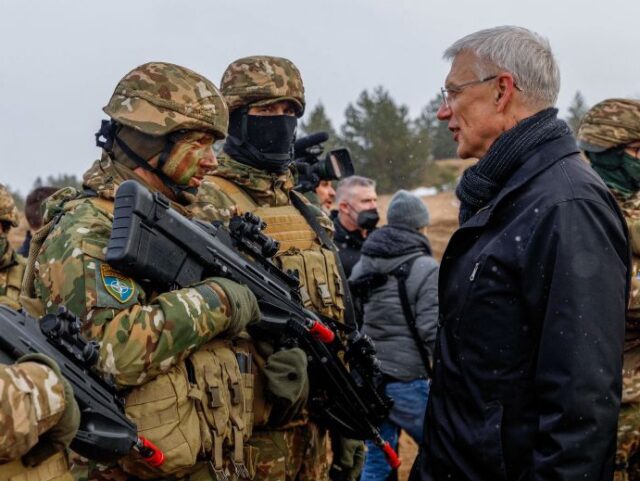Small European state Latvia has articulated its support for Emmanuel Macron’s explosive talk of deploying NATO troops to Ukraine, saying “We need to make sure that Ukraine wins in this war.”
While NATO in general, and particularly its more Western members remain very concerned about the repeated, almost daily, exhortations from French President Emmanuel Macron that the time for ‘boots on the ground’ in Ukraine may be coming, he is finding some support from the Eastern European states. These countries which have a land border with Russia and Belarus, or would do if Russia’s invasion of Ukraine continued unabated, feel directly threatened by Moscow expansionist sentiment and clearly wish to see a definite outcome for Russia’s invasion, discouraging it trying the same with others.
Macron Repeats Threat of Western Ground Forces in Ukraine ‘at Some Point’https://t.co/Mly8bd4g1L
— Breitbart London (@BreitbartLondon) March 17, 2024
Latvian Foreign Minister Krisjanis Karins has been touring European allies, and calling for European states to be ready for war, and is one of those voicing his support for President Macron’s pro-involvement stance for Ukraine. Speaking to Britain’s The Times, Karins said President Macron’s words are valuable because he is “encouraging allies to think outside the box”, and remarked ruling out sending troops to Ukraine is wrong.
Hitting similar talking points to Macron himself, who has cited tanks or cruise missiles as examples of support to Kyiv that were once said to be unthinkable but which are now supplied in great quantities by NATO partners, Karins continued said time and time again, the West had been paralysed by the fear of Russia reacting badly to them giving support. He claimed that every time, concern of Russian anger proved to be unsubstantiated.
The Latvian foreign minister said:
We have not individually but collectively been rather hesitant on supplying all kinds of aid… There has always been talk of escalation: ‘What will the Russians think? We don’t want to anger them.’ And Russia each time tries to frighten us.
Then we take the decision and nothing actually changes. So it shows there’s not much to fear because we already have a very widespread war in Europe. We need to make sure that Ukraine wins in this war.
French President Macron first broke the apparent vow of silence on the possibility of NATO troops going to Ukraine in Feburary, and while he’s said at the moment the support would be limited to roles like demining and repairing the advanced equipment given to Ukraine in-country, he’s also been clear that more could follow. Macron said this would only come if Ukraine looked like it was going to collapse and allow a Russian victory, but castigated his fellow NATO leaders for ruling out any such action, saying he wanted to keep President Putin guessing.
United Kingdom Should Reinstitute Military Conscription to Deter Russia, Urges NATO Allyhttps://t.co/eSv8F14Mnz
— Breitbart London (@BreitbartLondon) March 17, 2024
Those who said there was no chance for Western military intervention against Russia in Eastern Europe had already chosen defeat, the French leader said.
A trifecta of European leaders from France, Germany, and Poland met last week and while the outcome was agreeing to send more weapons and equipment to Ukraine, Macron still bookended the day with deployment talk. As reported, he had warned on Thursday night that “If Russia wins the war in Ukraine, Europe’s credibility would be reduced to zero” and Russian victory should not be permitted. After the talks, he hit those points again, saying: “Maybe at some point—I don’t want it, I won’t take the initiative—we will have to have operations on the ground, whatever they may be, to counter the Russian forces… France’s strength is that we can do it.”
While several NATO states have expressed concern at Macron’s willingness to go to war directly against Russia, including Germany, the United Kingdom, and the United States, perhaps the most telling contribution to that debate has been from Italy, where veteran politician Antonio Tajani pointed out that Macron is facing tough elections, and war talk can be a vote-winner. He rejected a Third World War-causing deployment, and asked rhetorically whether going to the brink with Putin might not be a cynical way of putting clear blue water between himself and his political opponents.
Italy Warns Sending NATO Troops Into Ukraine Could Lead to a ‘Third World War’, Accuses Macron of Exploiting Conflict for Political Purposeshttps://t.co/SBKHewLyy4
— Breitbart London (@BreitbartLondon) March 18, 2024

COMMENTS
Please let us know if you're having issues with commenting.